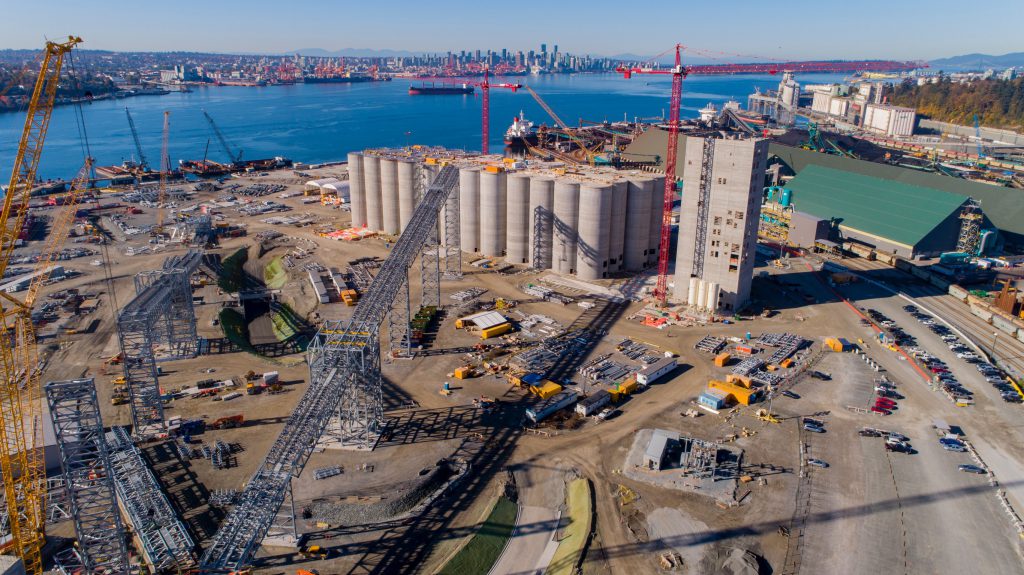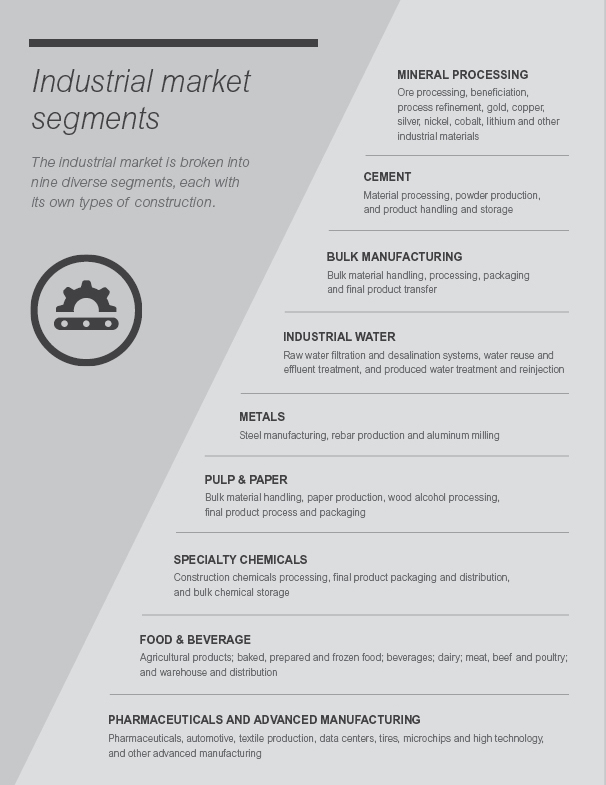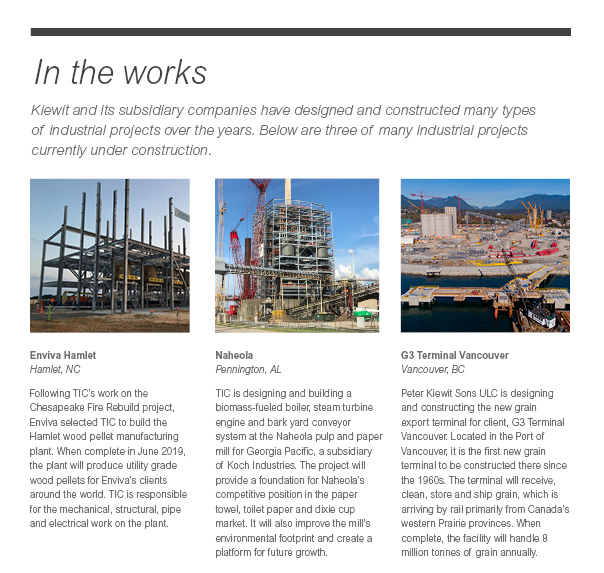Think about some of the things you need and use every day.
Sidewalks and driveways are poured with concrete.
Cars and trucks are built with steel.
People — and pets — eat food, drink beverages and take prescriptions.
Businesses use paper for writing, printing and mailing.
At first glance, none seem to have much in common.
Upon closer look, there’s a connection — at least at Kiewit.
All of these products fall into Kiewit’s new industrial market, a recent addition to the company’s six existing markets: building; mining; oil, gas and chemical; power; transportation; and water/wastewater.
While Kiewit and several of its subsidiary companies — namely TIC – The Industrial Company (TIC) and T.E. Ibberson, Co. (Ibberson) — have been designing and constructing industrial projects since their inception, today, the Kiewit organization is placing a more strategic focus on the industrial market with the goal of expanding its footprint in this growing area.
A market like no other
Industrial is Kiewit’s most diverse market, covering: mineral processing; cement; bulk manufacturing; industrial water; metals; pulp and paper; specialty chemicals; food and beverage; pharmaceuticals and advanced manufacturing. Although construction varies significantly, the end result is the same: consumer goods.
While there are ties between these different types of industrial projects, there are also elements that set them apart. Clients and competitors typically specialize in one area rather than operating in several.
“For example, in oil, gas and chemical, there are a lot of clients that cover multiple sub-markets: upstream, midstream and downstream,” explained Brian Deason, southeast area manager for TIC. “You don’t see that in industrial. You don’t see cement makers crossing over into pulp and paper, and you don’t see pulp and paper clients in food and beverage.”
Industrial opportunities are heavily impacted by different economic and political factors. Due to a recent push in the United States to increase domestic manufacturing in the country, industrial work is growing rapidly. According to Industrial Info Resources, industrial plant spending increased nearly 7 percent from 2017 to 2018; in southern states alone, industrial spending is forecasted to reach more than $164 billion, a 4.8 percent increase year over year.
Social factors also play a significant role in the market’s growth. Food and beverage continues to evolve to satisfy consumers’ ever-changing demands spanning from healthier, easy-to-prepare foods for families on the go, to no-grain, organic pet food. As craft brewers continue to gain popularity, the need for malt production has also increased.
Other parts of the industrial world have seen similar increases. For pulp and paper manufacturers, cardboard production has increased the last several years due to the popularity of online shopping. For aircraft and automobiles to meet fuel efficiency targets, the demand for high strength, lighter aluminum alloys and carbon fiber has grown.
Something old, something new
Kiewit has renewed its push for industrial work, tapping its recent and historic experience in industrial engineering and construction.
Peter Kiewit Sons ULC is designing and constructing the new high-capacity grain export terminal for client G3 Terminal Vancouver. Located in the Port of Vancouver, British Columbia, the project will optimize receiving, cleaning, storing and shipping of grain, which is coming primarily from Canada’s western Prairie provinces. When complete in 2020, the facility will handle 8 million tonnes of wheat, canola and other specialty crops.
Historically, TIC has participated in industrial projects that fall into the mineral processing, cement, bio-fuel, pulp and paper, and bulk manufacturing sub-markets. In June, TIC completed the Chesapeake Fire Rebuild project for Enviva, the world’s largest producer of utility grade wood pellets. Crews demolished and rebuilt portions of a wood pellet export facility, which caught fire in February 2018.
Ibberson is a long-time player in the food and beverage and cement sub-markets. Most recently, Ibberson completed the Convent Phase III project for Zen-Noh Grain in Convent, Louisiana. Ibberson also finished construction on a series of pet food projects, including a dry food dog plant in Hereford, Texas; a wet can food plant in Hereford, Texas; and an upgrade to a dry dog food plant in Dunkirk, New York.
“Putting a more overarching, strategic focus and the right resources on industrial work allows us to identify the key clients and know what’s going on in the marketplace, just like we do for our other markets,” said Deason. “It’s the right move to coordinate and maximize our collective experience and resources.”
The shift also allows Kiewit to align more closely with standard industry conventions. For example, Engineering News Record (ENR) recognizes Industrial Process — which includes pulp and paper mills, steel mills, non-ferrous metal refineries, pharmaceutical plants, chemical plants, food plants and other processing plants — as its own market.
Setting up for success
Earlier this year, Kiewit set up a new office in Atlanta to focus heavily on pursuing and building industrial work. The location is both strategic and practical: 80 percent of industrial clients and their facilities are located within a four- to five-hour drive or one-hour flight from the city.
To increase Kiewit’s depth of knowledge in the market, Deason and his team have added business development managers and operations personnel with extensive industrial backgrounds to complement the organization’s existing expertise, especially in food and beverage work.
Beyond expanding its construction team, Kiewit is ramping up its industrial engineering services to perform detailed design and third-party engineering coordination for industrial projects.
“It’s really been an evolution of engineering execution,” said Megan Armstrong, industrial engineering director at Kiewit Engineering Group Inc. “For the G3 Terminal Vancouver project and several others, we’ve been continuously improving and developing how we execute projects with multi-faceted Kiewit engineering teams. We’re really excited about the future.”
With strong past experience and a new strategic focus, the industrial market presents a positive future opportunity for Kiewit.
With more than $4 billion in industrial design and construction on Kiewit’s radar, that piece of business could be much bigger, indeed.
“One thing many of our employees love about working for Kiewit is the ability to move around the country and do different types of work,” said Deason. “This market will present additional opportunities for those who want to try something entirely different in their careers.”
With so much growth and many different sub-markets — each with different construction, clients and competitors — the adventures for Kiewit employees may be endless.





